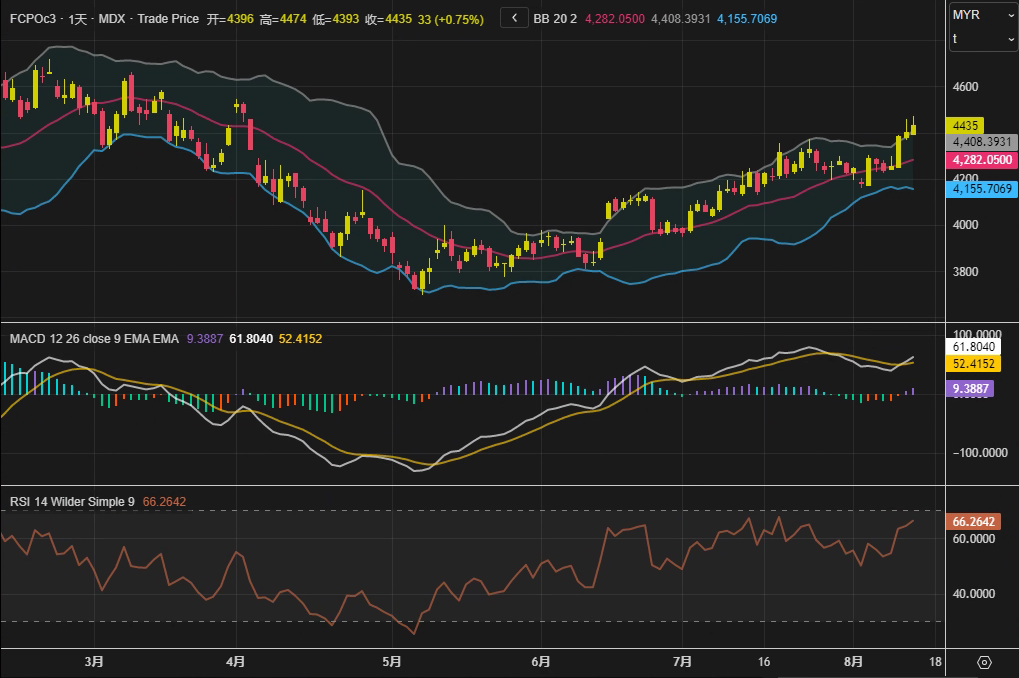Strong breakthrough! Palm oil hits 4500 for the fourth consecutive day, tariff policy triggers oil and fat market boom
2025-08-13 19:14:02

Policy shocks reshape oil and fat trade landscape
On August 12th, Beijing time, China's Ministry of Commerce announced the preliminary ruling of its anti-dumping investigation into canola imports from Canada. The investigation uncovered extensive agricultural subsidy policies in Canada, deeming it a special market situation. A provisional anti-dumping duty of 75.8% was imposed on Canadian canola imports, effective August 14th. Anilkumar Bagani, Head of Research at Sunvin Group in Mumbai, noted: "Chinese rapeseed oil futures surged today, directly driving up palm oil and soybean oil. This policy may cause Chinese buyers to turn to Southeast Asian palm oil to fill the shortfall." Notably, Malaysia has raised its September crude palm oil reference price, raising its export tariff to 10%, further tightening supply expectations.
Cross-market linkage and substitution effects
Chicago Board of Trade (CBOT) soybean oil prices rose only slightly by 0.28%, contrasting with the strength in the Dalian market. This divergence reflects differing regional fundamentals: Chinese oil and fat inventories are at a seasonally low level, while North American new-crop soybean crushing has yet to be fully utilized. The Indian market presents a different picture: data from six traders indicate that the country's soybean oil imports in 2024/25 are expected to surge 60% year-on-year, reaching a record high; while palm oil imports are likely to decline 13.5% to 7.8 million tons, a five-year low. This confirms that, given the current price differential, the substitution effect of soybean oil for palm oil is deepening in the South Asian market.
Exchange rate and policy variable disturbances
The ringgit appreciated 0.54% against the US dollar today, somewhat weakening the export price competitiveness of Malaysian palm oil. However, industry insiders believe that the impact of unexpected Chinese policies will continue to dominate in the short term. A Singaporean multinational trader added, "If Canadian canola import costs remain high, China's palm oil purchases in the fourth quarter may increase by 8%-10% month-over-month, but caution should be exercised against the potential price pressure from increased Indonesian production."
Institutional Viewpoint Focus
Sunvin Group : Bagani emphasized that "the jump in China's rapeseed oil import costs will reshape the oil consumption structure, and the cost-effectiveness advantage of palm oil may be highlighted again in South China."
A research report from a well-known institution : Malaysia's export tax increase in September may curb short-term buying interest, but the increase in China's demand is expected to partially offset this impact.
Indian Solvent Extractors' Association : Preliminary data showed that India's palm oil imports fell 21% year-on-year in July, confirming the continuation of the soybean oil substitution trend.

- Risk Warning and Disclaimer
- The market involves risk, and trading may not be suitable for all investors. This article is for reference only and does not constitute personal investment advice, nor does it take into account certain users’ specific investment objectives, financial situation, or other needs. Any investment decisions made based on this information are at your own risk.





















